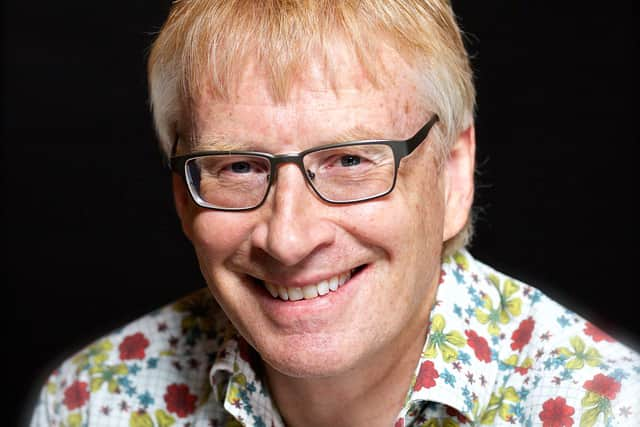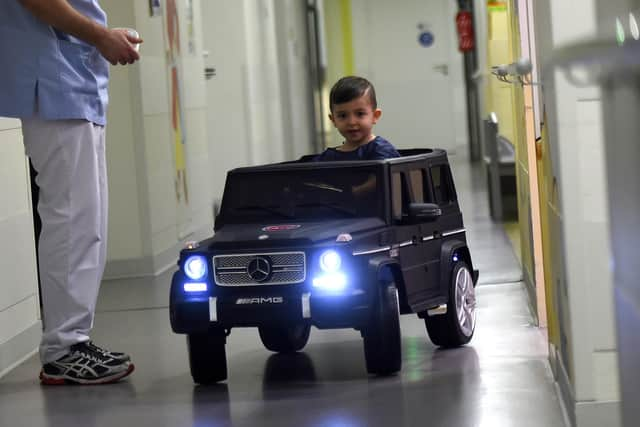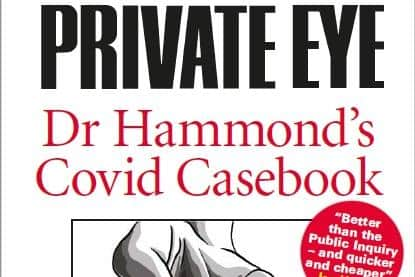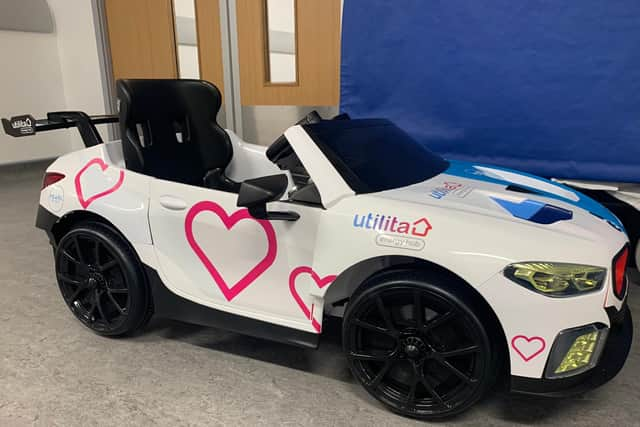Private Eye’s MD impressed as patients drive themselves to theatre at Edinburgh's new Sick Kids
and live on Freeview channel 276
Let us know what you think and join the conversation at the bottom of this article
Private Eye's outspoken in-house MD, who finds himself in the Capital’s new Royal Hospital for Children and Young People in the first episode of his new Radio 4 comedy series, Phil's Bedside Manner, is talking ahead of its broadcast on Thursday.
Recorded during pandemic, the programme brings a mix of comedy and documentary to the airwaves as Phil talks to porters, patients, cleaners, cardiologists, visitors, volunteers, managers and medics, after which he performs a free stand-up show for the staff based on what he's heard and the stories he has been told.
Advertisement
Hide AdAdvertisement
Hide Ad

The Edinburgh episode was recorded last June, he reveals, when nearly all the interviews had to be done outdoors and his stand-up performance was restricted to a maximum audience of 30 people, all socially distanced, wearing masks and with the windows open.
"But the beauty of radio is you can make that sound like a full house,” he smiles, “If it was filmed, it would look slightly sparse, but bless them, the NHS love it when you put on something for free because they get very little entertainment these days."
READ MORE: Sick Kids: New helipad at NHS Lothian’s Royal Hospital for Children and Young People has lift off
Remembering his visit, the 59-year-old, who works with children and young people himself, admits he was impressed by the Capital's new hospital.


"I know there have been controversies about the siting of it and the time it took to build, but the hospital itself is lovely. I think, because they consulted children and young people in the building of it, you go in and find this extraordinary castle design, they even have a dragon that is sick on the doctors. The kids like that,” he quips.
Advertisement
Hide AdAdvertisement
Hide Ad"In terms of designing a place for kids that allows them to play and and access their educational needs while they are ill, the hospital is quite extraordinary and in the context of those really nice surroundings, we thought we'd talk to the play therapists and people who aren't normally featured in front-line NHS documentaries. It's usually doctors and nurses, but there is a whole team supporting the recovery of kids."
The onsite activities and design of the hospital also allow patients to be distracted from their condition, something Phil considers vitally important.
"I also work in a paediatric department and it is really important they are not defined by their condition. These are young people with their whole life ahead of them who just happen to have an unpleasant condition. It's really important they develop their personalities so, although their lives are restricted, it's important to adopt as holistic an approach as possible. I really got that sense in Edinburgh where there are wonderfully kind, empathic staff.”


He thinks for a moment before adding, “But the voices of the kids are also extraordinary. You can get kids who have the most difficult situations, really unpleasant cancers, and they teach us all a lesson in bravery, fortitude and humour.. the kids are often the bravest ones.”
Advertisement
Hide AdAdvertisement
Hide AdIn the radio show, Phil asks staff to share the jokes children have told.
It was in Edinburgh, while still a junior doctor, that Phil's comedy career was born in 1990.
"When I started at the Fringe, humour was a bit beaker and blacker and a bit more shocking than now. It was a defining moment in my life. In Struck Off and Die, the double act I did with Tony Gardner, we told some really shocking stories of nurses popping corpses in baths to warm them up and people’s heads coming off - the darkest stories we could come across, but people roared with laughter.


"Then Radio 4 came along, saw it and stuck it out before The Archers, completely inappropriate timing. It got record numbers of complaints and they were delighted they'd got noticed and offered us a series,” he laughs.
Advertisement
Hide AdAdvertisement
Hide Ad"So Edinburgh launched everything but it also helped me be a better doctor; I've always said you are more accountable as a comedian than a doctor. You can be a pretty awful doctor and still have a waiting room of patients because there aren't enough of us, but if you don't make people laugh in Edinburgh you don't get an audience."
He reflects that, as a result, he has become kinder over the years, not that there isn’t still a place for the darker humour so often used by emergency services as a coping mechanism.
"Unlike a lot of comedians who give up the day job, I wanted to remain a doctor. I love doing both so my comedy is less shocking now but I was keen to ask the question: Had comedy become less fun because we're slightly wary now of having outrageous medical gags to get us through the dark hours?
"What I discovered was that was these jokes are still happening, sometimes more in private and under the radar with people quantifying what they have just said, but a sense of humour is alive and kicking in the NHS.”
Advertisement
Hide AdAdvertisement
Hide AdHe continues, “The 'riotous story' in the Edinburgh programme came from a 'fairly dour consultant' who remembered someone being admitted at a previous hospital having inserted a door knob in their lower hole.
"The consultant tells how this gentleman explained his predicament. He lived alone, cooked in the nude and liked to eat his tea watching the telly. He was trying to take his meal from the kitchen to the living room but had a plate in one hand and a glass of wine in the other so he tried to open the door with his buttocks.
"It's clearly a ridiculous story. The punchline, which he tells very straight, is that when the paramedics arrived they had to break down the front door but couldn’t actually open the kitchen door as he was stuck to the other side. Now these are stories you couldn't make up and are the lifeblood of a NHS culture we've almost forgotten because of the horrors of Covid, but people in stressful situations have to laugh and bond as a team and that comes through in this programme.
“Other stories shared are moving, sad, uplifting and funny, which is in essence what the NHS is, so I collected these stories like a great ginger magpie and wove them into a celebration of the hospital."
Advertisement
Hide AdAdvertisement
Hide AdIt was while making his debut in Edinburgh that Phil also landed the role of Private Eye's MD after catching the eye of editor Ian Hislop. A collection of his Covid columns have just been published in the book, Private Eye: Dr Hammond’s Covid Casebook.
"It’s a running commentary of the pandemic,” he explains, “I tried to be constructive, balanced and not too brainy and wrote it as it happened. Just think, had I not done the Fringe in the first place and taken a chance, all these other opportunities wouldn't have come my way."
Looking forward, the naturally optimistic doctor concedes that realistic is probably a better word to describe his attitude towards the ongoing Covid pandemic now.
"Vaccines are the answer but we need to vaccinate the world," he says, bluntly. "I don't think we are ever going to eradicate this virus, we have to learn to live with it and may still need to wear masks in certain situations to reduce the risk of transmission further. However, within that context we needn't live our lives in fear. We can still enjoy outdoor events if we take sensible precautions. I'm fairly confident the double vaccination gives a decent degree of protection, we just need to add Covid to the risks we deal with every day instead of obsessing about it as a single risk.
Advertisement
Hide AdAdvertisement
Hide Ad"We can live with the risk of Covid and still have fun, that is the really important message."
Phil's Bedside Manner, BBC Radio 4, Thursday, August 26, 6.30pm, then BBC Sounds
Private Eye: Dr Hammond’s Covid Casebook, is now on sale, £9.99
A message from the Editor:
Thank you for reading this article. We're more reliant on your support than ever as the shift in consumer habits brought about by coronavirus impacts our advertisers.
If you haven't already, please consider supporting our trusted, fact-checked journalism by taking out a digital subscription.
Comment Guidelines
National World encourages reader discussion on our stories. User feedback, insights and back-and-forth exchanges add a rich layer of context to reporting. Please review our Community Guidelines before commenting.